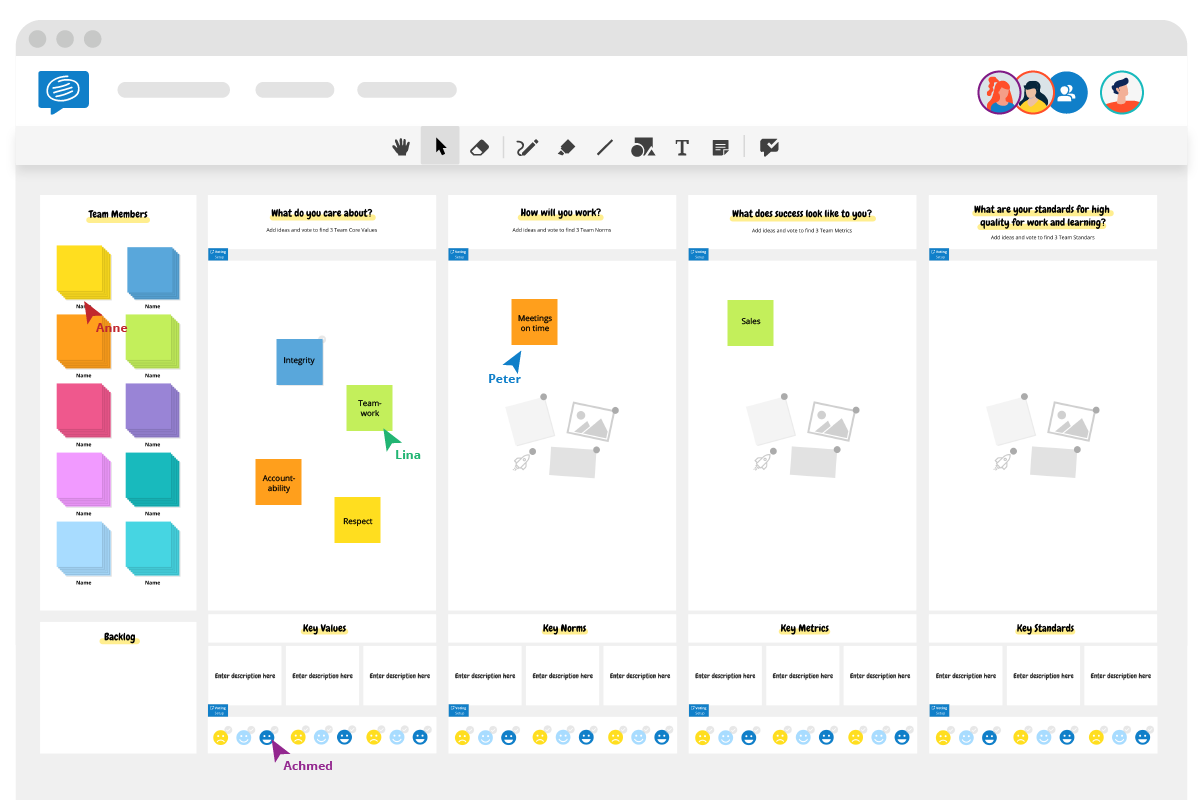Team Charter Template: The ultimate guide with free template 2025
A team charter is a document that clearly defines the expectations, responsibilities and roles of every team member. Using a simple, easy-to-use template will help you cover the five key areas that you need to create a team charter that is practical, actionable and manageable.

What is a team charter? [2026 updated]
In the business world, it’s impossible to avoid teamwork, so it’s important to invest time and energy into building strong, cohesive teams. But how can you build strong teams when you’re not face-to-face? This is where the team charter template comes in.
A team charter is a document that clearly defines the expectations, responsibilities and roles of every team member.
With cross-functional teams and multiple moving parts, this is easier said than done. Using a simple, easy-to-use template will help you cover the five key areas that you need to create a team charter that is practical, actionable and manageable.
Creating a team charter is a two-step process:
- Begin with a brainstorming session to collect everyone’s input
- Consolidate all ideas into one set of rules that everyone agrees on
Why a team charter is important
The major benefits of using a team charter template are:
- Work as a team towards a clear, shared vision
- Develop clear roles and responsibilities
- Improve and open up communications
- Clearly define milestones and goals
- Build relationships
The ultimate guide to a team charter template
Rule one of team charters: they should be completed collaboratively. The only way to reap the benefits of this exercise is by completing it as a team with input from everyone.
Regardless of where your team members are located, using a collaborative online whiteboard like Conceptboard ensures everyone can get on the same page.
So once you’ve invited your team to the collaborative template, follow our guide to make your own team charter.


What is included in a team charter?
Team members
In the first column, ask everyone to write their name and their individual strength and weaknesses on a sticky note. Encourage everyone to use a different color to distinguish everyone’s ideas.
Core values
The second column is for Core Values. Ask everyone to share the things they care about at work. Then discuss and agree on four or five top values held collectively. Move them to the Consolidate section at the bottom.
Group Norms
These are the practical ways your team wants to work together. While some team members may appreciate daily standup meetings, regular phone calls and texts, others may enjoy working quietly without distractions. So to ensure communication runs smoothly, it’s important to agree upon the group norms to avoid miscommunication down the track.
Metrics of success
What does success look like to your team? In this section, it’s important to look at the different markers of success, apart from just the bottom line. These might be time, quality, growth or teamwork related. Check out this piece on OKRs or Objectives and Key Results for inspiration on the importance of focusing on tangible metrics.
Roles
Define the roles, and who will play them? Start by clearly defining the major roles directly related to the project. You may also include less obvious roles such as mediator, treasurer and social organizer and enforcer of the team charter.
Standards of quality
What is the standard of work that your team will consider acceptable? This is important to define early on, and it will help you maintain high standards. Features such as timeliness, originality, depth of research, digital advancement and neatness might be some key criteria your team wants to strive for.
Discover visual collaboration
Collaborate seamlessly across teams and timezones with Conceptboard’s infinite digital whiteboard
Once you have at least four ideas in each of the Consolidate areas, the hard work is done! The final step is to take those ideas and turn them into complete sentences in one comprehensive document.
You can then export this document and share it with the team so it’s always in front of mind. If you want to take it one step further, ask all team members to sign the charter (digitally or physically) for an extra level of agreement. It’s a good idea to return to this team charter yearly to update it as the team grows and evolves.
Well done! By defining team expectations, you’ve taken the first step towards a strong team.
Example of a team charter template for leadership
Let’s look at the example of a new product team that has been created to improve cooperation and cohesion during the product development process.

If you would like to continue exploring how you can create close-knit teams, especially in remote or distributed settings, take a look at our other articles:
10 Steps To Effective Teamwork With The Team Canvas template
Why Communication Is the Greatest Challenge for Remote Teams
Hold better remote meetings with the Remote Meeting Canvas
If you want to see how Conceptboard can help your team work better visually, sign up for a free 30 day trial now.

